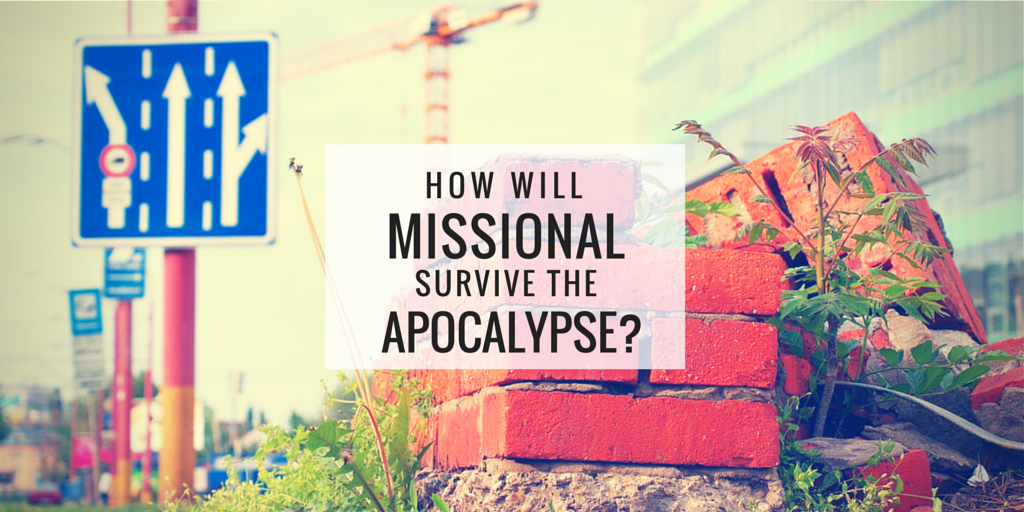I’m a total Sci-Fi fanatic. Most of the sci-fi post-apocalyptic movies or books that come out get me all jazzed up. I’m fascinated with the concept of how humanity survives when the existing structures previously depended upon on are no longer dependable. The Western World is changing. Many of the cultural structures that formed the church for centuries are disappearing.
The images of post-apocalyptic science fiction help me the think through the challenges and opportunities of “being the church” in our changing world.
How can the western body of Christ survive the impending collapse?
How will the mission of the church survive the future?
Missional Individualism
Cultivating a missional perspective is one of the most important recalibrations that a church can make for the future. I am greatly encouraged by this move, but I’ve observed that when a church “goes missional,” they often make a fundamental misstep that I believe fractures the longevity of missional momentum.
Innocently, many churches begin to preach, teach and stir up their congregants to “live missionally.” But often, it is fueled by individualism. High emphasis is placed on “me” to use “my”capacities to be missional.
Churches hand out “21 helpful hints for how to be missional” to their attendees. I love helpful hints, but in many ways, this approach places emphasis on an insidious drive embedded in Western culture: individual productivity.
Being missional can easily become a new collection of readily accessible methods in being productive. I’m convinced a missional life cannot be sustained individually.
For those of us born and bred in the good ole U-S-of-A, we approach things with a hyper-individualistic orientation. Because we are fed autonomy from a young age, we develop a vision of our spiritual lives as a sort of ladder. It is our role to “climb up” the ladder. If we fail, we “collapse under” it.
This is not the imagination of the New Testament family. This is not the mechanism for missional traction. This individualistic framework threatens the future of the Missional movement. It threatens the gospel’s pulse in a real-time neighborhood.
The Missional Pod
The ground floor of missional mobility is in the cultivation of community. After Christendom is in ashes, our primary witness will be the spaces we create for humans to become more fully human.
Creating these sustaining communities is even more difficult than creating missional energy, and I think that’s why it has become the church’s Achilles Heel. I detect that what currently is titled “community” are often task teams, affinity groups and sanitary programs with a cause.
While there is a level of gathering that happens in these groups, they often do not operate like covenant households. Mission finds its endurance in the on-going formation of community. Community is the “pod” that carries mission into the future.
The Garden Space
Community is the garden space where dirt gets underneath our fingernails. This is where we learn how to love well. It is the great exposure of those inner inclinations towards “selfish ambition and vain conceit” (Philippians 2:3.)
In our commitment to a together-life, we exercise muscles that we want to avoid using. This makes us more nimble for the long haul of missional living.
Community is more than “belonging;” it is about “becoming” and meeting the best and worst in ourselves. It is a profound instrument that acts like a scalpel and warm cup of tea at the same time.
Neutralization takes places in our missional endeavors when community is an addendum or afterthought. For the sake of God’s mission in the world, we need to engage in the physical and the particular, rather than being abstract when it comes to the agronomy of community.
Getting Particular
Here are two basic (but uncomfortable) rhythms that we disciple in those coming out of the fog of individualism and into the light of community. The intention is always to move past the rhetoric of community and into real reorientation.
1. Availability
We purpose to move from our place of security and separation to overlap our lives with one another. We make ourselves available through regular shared meals, babysitting each other’s kids, working on each other’s house projects, shopping together, reading together, enjoying holidays together, cooking together and even moving closer to one another.
This takes time, time, time to massage into our DNA. This inhabiting-ethos must become intentional. Naturally, when we think of “freedom,” we associate it with more space for independence and more personal rights. However, for the early New Testament faith communities, freedom was the fresh possibility to attach to one another beyond prescribed socio-political-ethnic identifications.
2. Vulnerability
We purpose to present ourselves incrementally as we are, “limited, afraid, insecure, angry and weak.” From my experience, this is the hardest risk to encourage people to take. We are so prone to protection, posing, and powering-up. I promise, at some point you will get hurt, offended and disappointed. For the sake of God’s mission, we need relational glue sticky enough that it can hold us together when we do not have our expectations met.
In the diagnostics of community, this work of vulnerability will often collide with two hidden impulses: inadequacy and cynicism. Both inadequacy and cynicism whisper in our mind’s voice. This voice tells us to “hold back,” “keep a distance,” “weigh your other options,” “be suspicious” and “duck out at the first sign of conflict.” We cannot genuinely bind with others without the value of vulnerability between us.
These two practices assemble a bare-bones communal frame for sustainable mission in our neighborhoods. Let’s not succumb to the narrative of individualism even in the championing of mission. Let’s not sweep the inconvenience and labor of community under the carpet anymore.
“Let’s Plant a V3 Church in my Neighborhood”
Share on Facebook
Tweet This
Share this Post

